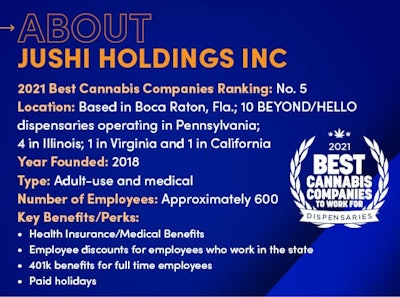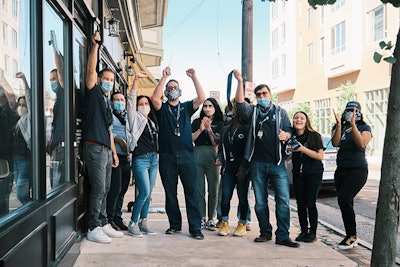
Editor's Note: Jushi Holdings Inc. was also honored in the 2020 Best Cannabis Companies to Work For - Dispensaries and Cultivation programs.
In a pandemic characterized by uncertainty, a robust employee communications strategy was essential for Jushi Holdings Inc.’s top-level management to ensure the everyday needs and concerns of workers across five states were met.
Jushi, a multi-state operator and owner of cannabis retail, cultivation and processing licenses based in Boca Raton, Fla., guided its employees through the height of COVID-19 with daily calls across all operations, which helped with team building and played an integral role in the company’s 2020 growth.

Photo courtesy of Jushi
In June 2019, Jushi opened its first Beyond/Hello branded retail location and ended that year with approximately 200 employees, six medical dispensaries and one cultivation facility. Since, the company has expanded to 16 retail locations and three cultivation facilities, with plans to open 10 to 12 additional retail locations and one processing facility by the end of 2021.
Jushi credits its employees and the company’s efforts to ensure that their needs are met, their voices are heard and that they feel valued and comfortable in the workplace, especially when health concerns were top-of-mind for staff, for how the company managed to grow exponentially during a pandemic.

“The COVID-19 crisis is impacting every business in some way or another,” says Jim Cacioppo, Jushi founder and CEO. “We at Jushi moved very quickly to augment our standard operating procedures to safeguard the health and safety of our patients, customers and employees.”
Aside from following each state’s rules and regulations and the standard CDC guidelines, Jushi also increased its communication efforts.
“We had business continuity calls every single day for months, with a corporate group, grower-processor group and retail group,” says Nichole Upshaw, Jushi’s executive vice president of human resources. “I would do calls with the stakeholders twice a week and report that information to our CEO. So, every week our Senior Management would be briefed on how employees were doing, challenges they were facing, how they can help, and so on.”
Before and during the pandemic, Jushi encouraged employee feedback through surveys to gain a better understanding of how they are feeling.
“It’s just listening,” Upshaw says. “You have to be a good listener, or you’re just not going to be the best employer you can be. We don’t know what each person is going through, and the best way we made it through was by listening to every person during this pandemic.”
Jushi also uses a decentralized human resources approach, where an HR manager is available in every state with on-the-ground operations, to make its employees feel valued and to provide them with essential resources.

“It’s important to take care of people on that ground-level, face-to-face, and focus on solving their problems when they are pebbles, not boulders,” Upshaw says. “That is one of the most basic things you can do to take care of people, is solve their problems, answer their questions and let them know what’s going on.”
As the company continues to grow, it has implemented quarterly all-hands-on meetings called “Blazing the Trail.” The calls help ensure that Jushi is reinforcing the company culture across all locations and keeping employees updated. It is also a way for employees to hear from the organization’s executives about how much everyone is appreciated and thanked for all they do, Upshaw says.
The company values creating a good workplace culture, and Upshaw says that effort truly starts with having the right leaders in place.

Photo courtesy of Jushi Holdings Inc.
“You can’t just be a great ‘place’ to work,” Upshaw says. “When you have multiple locations, you have to be great ‘places’ to work, and you cannot do that unless you have good managers in place. We really like to make sure we are putting our employees’ experiences in the right people’s hands and that the people who are leading our stores or facilities are the right leaders.”
Within the last year, in addition to voluntary turnover, Upshaw says Jushi made some changes at the leadership level, such as replacing retail store managers, moves the company does not hesitate to make if someone is not the right fit.
Upshaw stressed the importance of having a positive relationship between managers and employees, especially as the company continues to grow.
“Everyone has high hopes for 2021, including us,” Upshaw says. “We plan to continue to grow our retail footprint within the markets that we operate. To do that, we need our team members to continue to be great teachers and mentors to the individuals that are new to the organization. As much as we can, we want to elevate our employees to take on new responsibilities as we grow. “
Additionally, the company is ramping up its diversity and inclusion efforts to ensure its stores are filled with people of all backgrounds and varying talents, Upshaw says.
“We talk about this every day, and we are not afraid to call ourselves out,” she says. “For example, on the [Pennsylvania] retail side, when we took it over, it lacked diversity in the management levels. That is when we said we must look at these locations and see if they match the communities that they are in, and if they don’t, then we have to start from the top.”
Looking forward, the company is continuing to find ways to evolve the employee experience.
“When 2020 ended, we announced that we were going to start implementing annual [salary] increases for all field positions,” Upshaw says. “We are also about to roll out a retail performance bonus plan, where anyone in a management position is going to be eligible for a yearly bonus.”
If an employee has two years of tenure, employees can expect that to be reflected in their rate, she says.
“For example, if an employee is at $15 an hour and they’ve been with us for two years, let's just make it simple and say December, then they’re actually going to get a 6% raise instead of a 3% raise,” she says.
These are just some of the changes that will be happening with Jushi and its employees this year, and although 2020 is over, the pandemic continues.
“Unfortunately, the uncertainty of today’s environment amidst the crisis has caused delays in our plans to expand Jushi’s footprint in key operating markets,” Cacioppo says. “Specifically, regulatory and construction delays on current underway projects in Pennsylvania, California, Virginia and Ohio, may impact the timing as to when these new operations come online. While there is great uncertainty in the overall market, our strong balance sheet and supportive investor base provides us the financial flexibility to navigate these extraordinary times."


























